All prayer is directed to God, whether you're praying in your bedroom or Denver's Mile High Stadium filled with 80,000 people. However, the manner in which you pray and the words you speak should be tailored to the people listening and the place you are. In general, there are five tiers of prayer, each of which has a different style, content, and degree of intimacy:
- Personal: Personal prayer is quite obviously your private time between you and God alone. You know by now that personal prayer is a time of deep closeness between you and your loving Father in heaven. During this time, you can pray about anything and everything, anytime, and anywhere.
- Intimate: In intimate prayer, you pray with the people who are closest to you in all the world. Intimate prayer partners are typically your spouse, family members, your best friend, or a small set of trusted friends. You're likely to have different levels of intimacy even within this smallest of groups, but generally you'll freely share most concerns with these trusted people. Prayer time with intimates can even approach the same level of intimacy that personal prayer does.
- Small group: Small group prayer is what takes place within a Bible study, cell group, or accountability group. The group may or may not approach the level of closeness of the personal and intimate prayer tiers, but group members share a degree of friendship, trust, and commitment. Even at this level, personal prayer needs are freely shared and prayed upon.
- Church: Church prayer consists of prayer in a church service or other Christian context, but it takes place within a larger group of people whom you may or may not know personally. Prayer at this level should be heartfelt but more reserved than the first three tiers and should focus primarily on issues that affect the entire church.
- If you go to a small church of fewer than 30 or so members, there is much less distinction between the church and small group tiers. In fact, in rare cases, a small church can even begin to resemble a small group in terms of closeness.
- Community:Community prayer is the type of prayer said at town events that people of all beliefs and backgrounds attend. Examples include town festivities, memorial services, and graduations (depending on the latest court rulings, of course). Because people at such gatherings are likely to have different religious backgrounds, prayers should be the most formal and restrained in terms of their scope. You wouldn't, for example, want to pray for your mother-in-law's arthritis if you're called to give a prayer at the start of the World Series.
During community prayers, pray in a way that steadfastly upholds the integrity of your beliefs, while at the same time respecting the beliefs of others in attendance who have different religious backgrounds.
Churches, particularly evangelical Protestant ones, have become more informal over the past 30 years. One side effect of this newfound relaxed approach to worship is a blurring of the traditional boundaries between small group and church prayer. The sharing and praying that used to be done only in small, more intimate contexts is now being regularly done at the church level in many congregations today.
Openness and candor within the family of God are refreshing and healthy and should be encouraged. But, at the same time, churches should use common sense and wisdom when deciding what's appropriate when more people are gathered together.
Many churches, for example, offer a time to share prayer requests during worship. Although congregation participation is a good thing, this part of the service usually turns into a systematic listing of the current personal health problems of the church members. If you're regularly sharing your personal problems in church, you're confusing the function of the larger church (gathering as the body of Christ to worship and grow together) with your need for a smaller group with which to share deeply personal issues.
Public prayer works best when you focus on issues that impact the church congregation as a whole. But because you're bypassing issues "too intimate" for the church at large, make sure the church has small groups and other support options so that those personal needs are appropriately and sufficiently nurtured.
However, praying for special crisis or emergency needs of individuals is perfectly appropriate and desirable in the larger church context, but this practice should be the exception rather than the norm.
Public prayer shouldn't be intrusive, giving out private details about a person being prayed for that he or she may consider an invasion of privacy. For example, you probably wouldn't want to make these prayer requests in public:
"Lord, be with Al as he gets a tattoo removed from his buttocks tomorrow."
"And, please give provision to Frank, who is now 45 days behind on his Visa bill."
Finally, let the people being prayed for know before you pray for them to make sure that they don't have a problem with your singling them out in public prayer.

